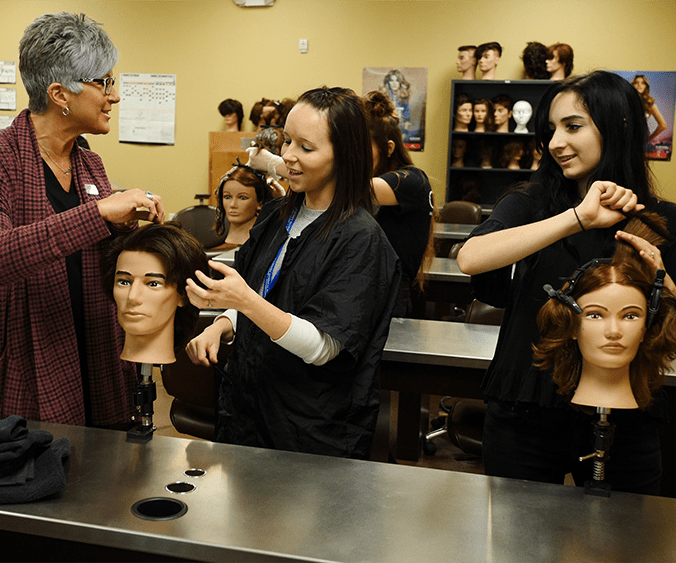How Long is Cosmetology School? Uncover the Timeline!

Cosmetology school typically lasts about 9 to 15 months, depending on the program and state requirements. During this time, students learn various beauty techniques and skills.
Whether you’re passionate about hair styling, makeup artistry, or skincare, cosmetology school provides the necessary training to kickstart your career in the beauty industry. The hands-on experience and knowledge gained from cosmetology school are essential for becoming a successful cosmetologist.
In addition to technical skills, students also learn about client communication, sanitation practices, and business management, setting them up for a rewarding and fulfilling career in the beauty field. Let’s explore the journey and opportunities that await you in the world of cosmetology.
Introduction To Cosmetology Education
Discover the duration of cosmetology school, typically ranging from 9 to 15 months, depending on the program. Gain hands-on experience and knowledge in various beauty techniques, preparing you for a rewarding career in the beauty industry.
The Allure Of Beauty Careers
Cosmetology education opens up a world of exciting possibilities in the beauty industry. With a strong emphasis on creativity and personal expression, a career in cosmetology can be both fulfilling and financially rewarding. Whether you dream of becoming a skilled hairstylist, makeup artist, esthetician, or nail technician, attending cosmetology school is the first step towards turning your passion for beauty into a successful profession.
What Is Cosmetology School?
Cosmetology school is a specialized educational institution that provides comprehensive training in various beauty disciplines. It is a place where aspiring beauty professionals learn the skills and techniques necessary to excel in their chosen field. From mastering the art of hair cutting and styling to understanding the science behind skincare and makeup application, cosmetology school offers a well-rounded curriculum designed to equip students with the knowledge and expertise needed to thrive in the beauty industry.
Why Attend Cosmetology School?
Attending cosmetology school offers numerous benefits that contribute to the success of aspiring beauty professionals. Here are some compelling reasons why individuals choose to pursue their education in cosmetology: 1. Hands-On Experience: Cosmetology school provides extensive hands-on training, allowing students to practice their skills in a supervised environment. This practical experience is crucial in building confidence and proficiency in various beauty techniques. 2. Industry-Relevant Curriculum: Cosmetology schools offer up-to-date and industry-relevant curricula that cover a wide range of beauty topics. Students gain a solid foundation in hairstyling, makeup application, skincare, nail care, and more, ensuring they are well-prepared for the demands of the beauty industry. 3. Networking Opportunities: Cosmetology school provides a platform for students to connect with industry professionals, fellow students, and potential employers. Building a strong network can open doors to job opportunities, mentorship, and valuable connections within the beauty industry. 4. Licensing and Certification: Graduating from an accredited cosmetology school is often a requirement for obtaining a cosmetology license. This license is essential for practicing legally in many states, ensuring credibility and professionalism in the beauty field. 5. Career Advancement: Cosmetology school equips students with the skills and knowledge needed to excel in their chosen beauty careers. With a solid education foundation, graduates have better prospects for career advancement, whether it’s working in top salons, opening their own beauty businesses, or becoming educators themselves. In conclusion, attending cosmetology school is a vital step towards pursuing a successful career in the beauty industry. The comprehensive education, practical experience, and networking opportunities provided by cosmetology schools pave the way for aspiring beauty professionals to turn their passion into a lifelong profession.
Typical Duration Of Cosmetology Programs
Cosmetology programs typically range from 9 months to 2 years, depending on the state’s requirements. Some states may require 1,500 hours of training, while others may need 2,100 hours. The program covers various aspects of beauty, including hair, skincare, and nail care.
Cosmetology is a popular career choice for many individuals who are interested in hair, makeup, and skincare. If you are considering becoming a cosmetologist, one of the first questions you may have is, “How long is cosmetology school?” The answer to this question can vary depending on a few factors, such as the type of program you choose, whether you attend full-time or part-time, and if you opt for an accelerated course.
Full-time Vs. Part-time Schedules
One of the factors that can impact the length of your cosmetology program is whether you choose to attend full-time or part-time. Full-time students typically complete their programs faster than part-time students because they attend classes more frequently. A full-time cosmetology program can take anywhere from 9 to 15 months to complete, depending on the school and state requirements. On the other hand, a part-time program can take up to 2 years to complete.
Accelerated Courses
Another option for students who want to complete their cosmetology program quickly is an accelerated course. These courses are designed to cover the same material as a traditional program but in a shorter amount of time. Accelerated courses can take anywhere from 4 to 6 months to complete, depending on the school and state requirements. However, it’s important to note that accelerated courses may be more intense and require more dedication from students. In summary, the length of your cosmetology program will depend on the type of program you choose, whether you attend full-time or part-time, and if you opt for an accelerated course. Full-time programs can take anywhere from 9 to 15 months to complete, part-time programs can take up to 2 years, and accelerated courses can take anywhere from 4 to 6 months. It’s important to choose a program that fits your schedule and learning style, so you can get the most out of your cosmetology education.
Factors Affecting Program Length
When it comes to pursuing a career in cosmetology, one of the first questions that may come to mind is, “How long is cosmetology school?” The length of a cosmetology program can vary depending on several factors. Understanding these factors can help you plan your education and career goals more effectively. Let’s explore some of the key factors that can affect the length of a cosmetology program.
State Licensing Requirements
State licensing requirements play a significant role in determining the duration of a cosmetology program. Each state has its own specific guidelines and regulations that aspiring cosmetologists must meet in order to obtain their license. Some states may require more hours of training and education, while others may have fewer requirements. It is essential to research the licensing requirements of the state where you plan to work, as this will directly impact the length of your cosmetology program.
Curriculum Complexity
The complexity of the curriculum is another factor that affects the length of a cosmetology program. Cosmetology programs typically cover a wide range of subjects, including hair styling, skincare, nail care, makeup application, and more. The depth and breadth of these subjects can vary from program to program. Some programs may have a more extensive curriculum with in-depth training in specialized areas, which can result in a longer program duration. Conversely, other programs may have a more condensed curriculum, focusing on the essentials, and thus have a shorter duration.
Moreover, the curriculum complexity may also depend on the type of cosmetology program you choose. For example, a full-time program can be more intense and comprehensive, covering a wider range of topics within a shorter period. On the other hand, part-time or evening programs may spread the curriculum over a longer duration to accommodate students who are juggling other commitments.
Considering your personal preferences, learning style, and availability, it is crucial to choose a program that aligns with your needs and goals.
In conclusion, the length of a cosmetology program can be influenced by various factors, including state licensing requirements and curriculum complexity. By understanding these factors, you can make an informed decision and choose a program that suits your career aspirations and time constraints.

Credit: www.empire.edu
Breaking Down The Curriculum
When considering a career in cosmetology, it’s important to understand the curriculum involved in obtaining a cosmetology license. Cosmetology school covers a wide range of topics and hands-on training to ensure students have a solid foundation in the field. In this article, we will break down the curriculum into core subjects and hands-on training, giving you a comprehensive overview of what to expect during your time in cosmetology school.
Core Subjects In Cosmetology
One of the first things you’ll learn in cosmetology school is the core subjects that form the basis of your education. These subjects cover various aspects of cosmetology, including:
- Hairstyling and cutting techniques
- Color theory and application
- Chemical treatments, such as perming and relaxing
- Skincare and facial treatments
- Makeup application and techniques
- Nail care, including manicures and pedicures
These core subjects provide a well-rounded education in the fundamentals of cosmetology and lay the groundwork for more specialized training later on.
Hands-on Training
While theoretical knowledge is important, cosmetology school also emphasizes hands-on training to ensure students are proficient in applying what they’ve learned. This practical experience allows students to develop their skills and gain confidence in performing various beauty treatments.
During hands-on training, students have the opportunity to practice and refine their techniques under the guidance of experienced instructors. They may work with mannequins or live models to gain real-world experience and learn how to interact with clients in a professional setting.
Hands-on training covers a wide range of practical skills, including:
- Hairstyling and cutting
- Hair coloring and highlighting
- Chemical treatments
- Facial treatments and skincare
- Makeup application
- Nail care and techniques
By combining theoretical knowledge with practical experience, cosmetology school ensures that students are well-prepared to enter the workforce as skilled professionals.
The Role Of Apprenticeships
Apprenticeships play a crucial role in the duration of cosmetology school. By combining practical work experience with formal education, apprenticeships offer students the opportunity to enhance their skills and knowledge in a real-world setting.
Combining Work With Education
Apprenticeships allow students to gain hands-on experience in a salon or spa while pursuing their formal education. This unique combination of work and learning enables students to apply their classroom knowledge directly to their practical work, reinforcing their understanding of cosmetology techniques and best practices.
Impact On School Duration
Participating in an apprenticeship can impact the overall duration of cosmetology school. The practical experience gained through apprenticeships may contribute to meeting the required training hours for licensure, potentially shortening the time needed to complete the program. Additionally, apprenticeships can provide valuable networking opportunities and industry connections that may lead to future employment upon graduation.

Credit: www.midwesttech.edu
Additional Certifications And Specializations
Cosmetology school typically lasts around 9-12 months for full-time students, but this can vary based on state requirements and program specialization. Additional certifications and specializations, such as hair coloring or skincare, may require extra training, adding to the overall duration of cosmetology education.
Advanced Techniques
After completing cosmetology school, many professionals choose to pursue advanced techniques to enhance their skills and career opportunities. These advanced techniques can include specialized training in hair coloring, hair extensions, chemical treatments, and advanced skincare. By obtaining additional certifications in these areas, cosmetologists can set themselves apart in the industry and offer a wider range of services to their clients.
Extending Your Study
Extending your study beyond the basic cosmetology curriculum can open up a world of opportunities. Many professionals opt to pursue additional certifications and specializations to expand their knowledge and stay updated with the latest trends and techniques. From special effects makeup to esthetician or nail technician certifications, the options for extending your study are diverse and can lead to a more diverse client base and increased earning potential.
Navigating Financial And Time Commitments
Cosmetology school typically lasts anywhere from 9 months to 2 years, depending on the program and the state’s licensing requirements. During this time, students navigate the financial and time commitments involved in pursuing a career in the beauty industry.
Cost Of Education
Cosmetology school tuition ranges from $6,500 to $20,000.
Financial aid options like scholarships and grants are available.
Balancing School With Personal Life
Create a study schedule to balance school and personal life.
Prioritize tasks and set aside time for relaxation.

Credit: www.deltatechnicalcollege.com
Life After Cosmetology School
Cosmetology school typically takes around 9 to 15 months to complete, depending on the program and the state’s requirements. After graduation, graduates can embark on a rewarding career in the beauty industry, with opportunities in salons, spas, and even entrepreneurship.
Start your journey towards a vibrant future in cosmetology today.
State Board Exams
Passing state board exams is crucial to becoming a licensed cosmetologist.
These exams test your knowledge and skills in various beauty treatments.
Kickstarting Your Career
Begin by gaining hands-on experience in a salon or spa setting.
Build a strong portfolio showcasing your expertise in diverse hair and makeup styles.
Continuing Education In Cosmetology
Continuing education in cosmetology is crucial to stay current with trends and enhance skills.
Staying Current With Trends
Regularly updating knowledge on latest techniques and styles.
Ongoing Learning Opportunities
Various workshops, seminars, and online courses available for cosmetologists.
Frequently Asked Questions
How Long Does It Take To Complete Cosmetology School?
Cosmetology school typically takes around 9 to 15 months to complete, depending on the program’s hours and curriculum. Some schools offer accelerated programs, while others may have part-time options.
What Factors Can Affect The Duration Of Cosmetology School?
The duration of cosmetology school can be influenced by factors such as the number of hours required for the program, the student’s attendance, and any breaks or holidays observed by the school.
Can I Complete Cosmetology School At My Own Pace?
Many cosmetology schools offer flexible scheduling, allowing students to attend part-time or full-time based on their availability. However, it’s important to check with the specific school for their policies on program duration and attendance requirements.
Conclusion
The length of cosmetology school varies depending on the program and state regulations. Students can choose from certificate, diploma, or degree programs that range from a few months to two years. Regardless of the length, cosmetology school provides valuable skills and knowledge to enter the beauty industry.
Graduates can pursue careers as hairstylists, makeup artists, estheticians, and more. It’s important to research and choose the right program that fits your career goals and schedule.



